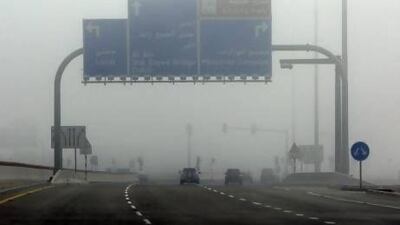DUBAI // Heavy fog caused disruption on the roads and at Abu Dhabi airport yesterday. And with fog expected again today drivers are being urged to use caution when travelling during the peak morning rush hour.
Fog in the morning cut visibility to just 50 metres in most areas for motorists driving between Dubai and Abu Dhabi, and the National Centre of Meteorology and Seismology is warning of more of the same today.
The conditions in Abu Dhabi led to three flights being diverted. Two planes were diverted to Al Ain and one to Muscat "due to technical requirements in low visibility conditions", said Ahmad Al Haddabi, chief operating officer at Abu Dhabi Airports Company.
Several other flights "experienced minor delays", Mr Al Haddabi added.
Temperatures are expected to drop tomorrow and misty weather is expected inland on Thursday morning. "Clouds will start to accumulate over the sea and the Western regions with a slight chance of rain," meteorologist Sufian Sarrah said.
Col Khamis Isaaq, deputy director of the Abu Dhabi Traffic and Patrol Directorate, said motorists should exercise caution, reduce speed on city roads and motorways - especially late at night and early in the morning - and to listen for driving conditions from Abu Dhabi police broadcast on radio stations.
Although no major problems were reported yesterday, police stressed the need to drive safely to avoid a repeat of last week's spate of accidents that occurred as a result of bad weather across the country.
There were more than 630 accidents in Dubai and Abu Dhabi last Monday caused by motorists unprepared for driving in wet conditions.
As the winter continues, experts have stressed the need to leave a safe distance between the vehicle in front and to drive slower.
In October, Hussain Saeed, the training manager at Belhasa Driving Centre in Dubai, urged drivers to delay their trips rather than risk their lives in poor visibility.
"If you don't see the road ahead of you ... it's better to stop," he said.
He advised drivers to slow down, use low-beam headlights, avoid changing lanes, minimise distractions and never use blinking hazard lights unless there is an emergency or they have stopped.
Fog has been a particular problem for motorists in recent years.
On October 18, 2011 more than a dozen people were injured in a 32-car smash on the Dubai Bypass road. Police blamed the accident on people driving at high speeds in low visibility. On October 21, 2008 four people died and 350 were injured in a massive pile up of more than 200 vehicles on Sheikh Zayed Street in Abu Dhabi.
To try to reduce the number of accidents caused by fog, Dubai installed 14 new monitoring stations at the beginning of this year to alert drivers of weather conditions and to slow the speed of traffic.
Drivers involved in an accident should report it by calling 999.
If the crash is minor and no one is injured, move the cars involved to the side of the road. However, if doing this will make it difficult to determine who is at fault, keep the vehicles in place.
Police will determine who was to blame. If the other driver leaves before police arrive, make a note of the make, model and number plate of the car.
Police will provide a green form if the driver is not at fault and a pink one to the driver believed to have caused the accident. Drivers should always carry their licence, registration and insurance.
* With additional reporting by Vivian Nereim

